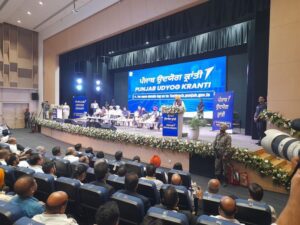PUNJAB TO DEVELOP ENERGY ACTION PLAN TO REDUCE GREENHOUSE GAS EMISSION

– PEDA fixes target of 2500 MW renewable energy capacity in Punjab, says Sumeet Jarangal
Chandigarh, 21 October 2022 : In yet another move aimed at making optimum use of natural resources, Punjab will soon come up with an Energy Action Plan, which will help in reducing Greenhouse Gas (GHG) emission by adopting new and innovative clean energy technologies, informed Mr. Sumeet Jarangal, Chief Executive Punjab Energy Development Agency (PEDA). He was addressing the capacity building workshop on Training Needs Assessment (TNA) for State Energy Action Plan, here.
Mr. Jarangal said that PEDA is striving hard to achieve the target of 2500 MW renewable energy capacity in Punjab and the Energy Action Plan will facilitate all stakeholder departments to implement Energy Efficiency & Renewable Energy in their institution at the State level. He said that different departments of the state, which were till date merely the energy consumers, will now play a pivotal role in the energy transition & development of the future energy systems as the state is on the journey towards energy transition to ensure a clean and green environment, he added.
The workshop was aimed to facilitate wider discussions on the strategy paper and to gather the valuable inputs of the stakeholder departments, said the Chief Executive, while adding that the deliberations of the workshop were useful to facilitate wider discussions on strategy paper, proposed training framework and finalize the action plan for capacity building in the state. A comprehensive blueprint will be developed for necessary training and capacity building programs on the basis of inputs received from the workshop. This will be followed by the creation of a network of training institutions and trainers to identify, plan, and roll out training programs for various aspects of energy planning and implementation.
He said that Punjab will identify potential areas for training of government departments and officials for the multi-sectoral energy planning. The team has already undertaken a survey to understand such needs through interviewing various officers in different departments in Punjab. A strategy document on ‘training and capacity needs framework’ has been developed for the state of Punjab based on findings from this survey.
Notably, GIZ (German Development Cooperation) has initiated Training Need Assessment with its partner Deloitte India to understand/assess knowledge/skill gaps) and understand the preparedness of departments in taking up new roles in Energy Planning and Sustainability in Punjab.
Ms. Nidhi Sarin and
Mr. Manoj Mahata, representatives of GIZ and Additional Director PEDA Mr. Jaspal Singh were also present in the workshop.


